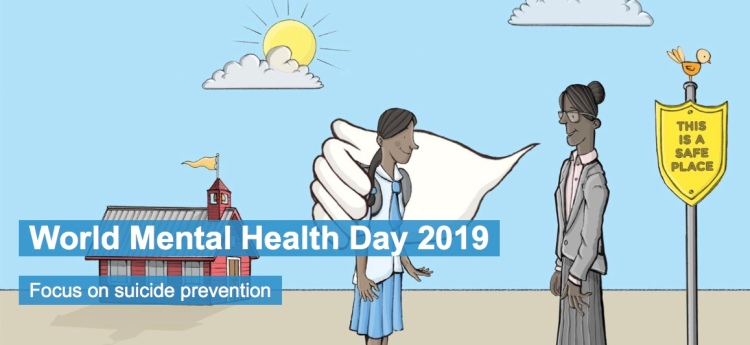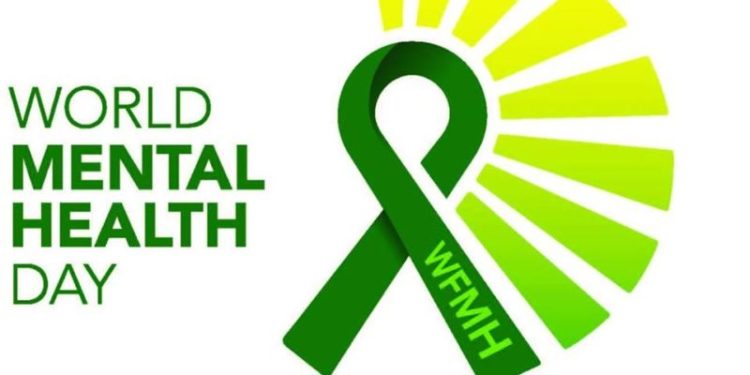
Today 10th Oct 2019 is World Mental Health Day and this year’s theme is suicide prevention.
It is one calendar month on from World Suicide Prevention Day.
Statistics show that worldwide almost 800,000 people take their life each year; this is more than the combined total populations of both Iceland and Malta.
Or put another way, it is one suicide every 40 seconds.
And suicides are preventable.
In the UK, suicide is the main cause of death for young people aged between 20-34. After each suicide, family, friends, colleagues, even communities have to deal with the tragedy.
Suicidal thoughts can affect anyone, at any time.
Men and those in the LGBTQ community are more at risk. Suicide is also higher in Western countries and here three times as many men die as women from suicide.
Many have experienced suicide in their family, friends network, or workplace, and those that haven’t will perhaps be aware of a celebrity that has taken their own life: Ernest Hemingway, Robin Williams, Gary Speed to name a few.
Sadly there is still a stigma about mental health, which many are working to change. And not all governments have a strategy for suicide prevention.
It can be difficult to express having suicidal thoughts to others due to a perceived view of being weak or maybe selfish. Consequently you may hide these thoughts, which may prevent you from getting the help you need. Having suicidal thoughts does not mean you will take action to end you life: about 20% of the population will have suicidal thoughts at some stage in their life, but less than 7% will act on these.
You are likely to have had some feelings of desperation, hopelessness, or worthlessness for a period of time beforehand.
It may be difficult to put your finger on the exact cause, as it could be a combination of factors.
When I was circa 25, I did have suicidal thoughts myself and felt both desperate and hopeless, and definitely not understood. I never got as far as planning, but it was a low point at a supposed prime time in my life.
I once had a counselling tutor who labelled suicide as a “cry for help”.
I remember challenging this at the time. It seemed like a judgement to me, as anyone at the point of taking their own life is by definition in a very desperate place.
I understand that circa 6/7 out of ten who tried but didn’t take their own life are glad they survived; which would leave the other 3/4 who still want to die and who may with the right help come to a difference stance later on.
Changing attitudes towards mental health may well need help from celebrities, TV, newspapers, and especially social media.
Some may argue that all these media actually contribute to low mood.
Many of us are on social media and can get drawn into comparisons, perhaps feeling inadequate or not good enough.
Personally I stopped watching the news (and TV in general) some years ago and feel better for it. A quick glance at an online newspaper this morning only has “bad” news: fighting in the Middle East, supermarkets ripping off suppliers in the third world, a person suspected of causing a fatal road accident claiming diplomatic immunity from the safety of their own country, 50% of children aged 11-16 say they have gambled (in the UK), a gunman arrested after a rampage; extreme weather causes cancellation of a Rugby match; and the daily update on the Brexit impasse.
There is not a single “good” thing in these top seven articles.
As for social media, much has been written about the algorithms, the “need” to compare yourself to others, the “high” of a “like” or new follower with the opposite also applying.
A start has been made to reduce with a view to eliminating as much as possible the stigma of mental health.
Suicide is preventable and a tragedy for the family and we need and must do more.

If you are in immediate distress or feel suicidal, then please contact:
UK/Ireland – the Samaritans on tel: 116123
You can still call even if you don’t have credit on your mobile, and the number won’t show up on phone bills.
Email: [email protected]
Visit the Samaritans website for details of how to get face-to-face help:
http://www.samaritans.org/how-we-can-help-you/contact-us
In the USA, the National Suicide Prevention Lifeline is: 1-800-273-8255
For Australia, the crisis support service Lifeline is: 13 11 14
International – Other international suicide helplines can be found at Befrienders Worldwide: http://www.befrienders.org
Help for those bereaved by suicide:
Support After Suicide https://supportaftersuicide.org.uk/
Survivors of Bereavement by Suicide https://uksobs.org/
Papyrus https://papyrus-uk.org
Winston’s Wish (grief in children) https://www.winstonswish.org
Cruse Bereavement Care https://www.cruse.org.uk
If you wish to help those ending the stigma of mental health, as well as those listed above, here are some charities to contact:
National Suicide Prevention Alliance https://www.nspa.org.uk/
Time To Change https://www.time-to-change.org.uk
Mind https://www.mind.org.uk
Photo credits :
WHO http://who.int
University of Leeds https://equality.leeds.ac.uk
#WorldMentalHealthDay
#WorldMentalHealthDay2019
#suicide
#suicideprevention
@WHO
@TimeToChange
@aftersuicideUK
@papyrus_tweets
@winstonswish
@mindcharity
@crusecare
@samaritans
This is a greatt post thanks
LikeLiked by 1 person